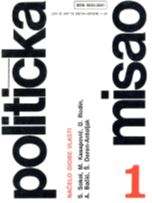Konstitucionalizam i podjela vlasti u ≫reaktivnim≪ ustavima postkomunističkog razdoblja
Constitutionalism and the Separation of Power in the ≫Reactive≪ Constitutions of the Post-Communist Period
Author(s): Arsen BačićSubject(s): Constitutional Law, Government/Political systems, Transformation Period (1990 - 2010)
Published by: Fakultet političkih znanosti u Zagrebu
Keywords: Constitutionalism; power separation; post-communist period; constitutions;
Summary/Abstract: From the beginnings of democratic constitutionalism the principle of separation of power has been considered as an inavoidable principle for the foundation and functioning of a modern state. In the theory and practice of Western democracies separation of power is therefore one of their first principles as well as problems. Yet the appearance of the ≫new democracies≪, i.e. countries issuing from the circle of Socialist constitutionalism, updates the significance of this topic even there where the principle in question was being resolutely rejected until recently. The return to the principle of separation of power is also documented by the so-called reactive constitutions (V. Bogdanor) which have appeared as transitory or new constitutions in former Socialist countries. The author discusses the link between constitutionalism and the separation of power in old and new democracies and concludes that the principle of separation of power remains one of the means by which countries try to achieve genuine democratically constitutional government.
Journal: Politička Misao
- Issue Year: XXIX/1992
- Issue No: 01
- Page Range: 43-55
- Page Count: 13
- Language: Croatian

